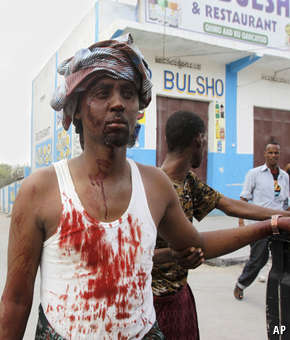WHEN the British and Swedish ambassadors to Somalia recently queued up to meet a new member of the government appointed by the third prime minister in 18 months, the man they met was so new to Somali politics that a government adviser was unsure of his name. But it was not long before Mohamed Omar Arte, the incoming deputy prime minister, found himself in the midst of the bloody turmoil that remains a grim hallmark of politics in Somalia. On February 20th, two days after he met the Western envoys, he narrowly escaped with his life when suicide-bombers from the Shabab, Somalia’s extreme Islamist group linked to al-Qaeda, attacked a hotel in Mogadishu, the capital,  during Friday prayers, killing 25 people (plus both bombers). On March 27th gunmen hit another Mogadishu hotel popular with politicians, killing at least 17 people.
during Friday prayers, killing 25 people (plus both bombers). On March 27th gunmen hit another Mogadishu hotel popular with politicians, killing at least 17 people.
Meanwhile, strife within the government continues to damage President Hassan Sheikh Mohamud. After his election in 2012 he was greeted as a breath of fresh air. Respected for his record as a human-rights enthusiast, he was free of the blood and murk that stained so many of Somalia’s more seasoned politicians. He was chosen by a 275-strong parliament whose members were nominated by elders from a cross-section of clans. Though it was a flawed method, with plenty of vote-buying and little direct say for ordinary Somalis, it was better than what had gone before.
But Mr Mohamud has since squandered much of the goodwill of war-weary Somalis and vexed foreigners alike. Corruption remains rife. Political progress is glacial. Since late last year the president and prime minister have been locked in an argument over who has the right to hire and fire ministers. The president won, a new prime minister was named, and in February his cabinet was approved at the parliament’s third attempt.
The political crisis has been “devastating”, says Abdirashid Hashi of the Heritage Institute for Policy Studies, based in Mogadishu.“It has ruined the leaders’ reputation,” he says. In theory there will be a new constitution and fresh elections by September next year. But despite the constant chivvying of Western governments and international agencies, few think that deadline will now be met.
Nonetheless, diplomats refuse to discuss an alternative plan for fear that Somalia’s politicians may ditch the present one forthwith. “The election should not be clan elders in a conference room selecting MPs, who then select a president,” says Michele Cervone d’Urso, the European Union’s ambassador, recalling Mr Mohamud’s advent to power in 2012. “We should aim for one person, one vote across Somalia,” says Neil Wigan, Britain’s ambassador. “But exactly what’s going to be possible, we’ll have to see.” Ken Menkhaus, a Somalia expert from Davidson College in North Carolina, says some kind of “appointocracy” is once again inevitable.
Mr Mohamud’s biggest success so far has been to bring in an element of federalism without worsening the strife. Two new regional states are in their infancy. Devolving a measure of power to such newly created states may prove a good idea only so long as it is not seen as another stitch-up by the old guard in Mogadishu. “It’s not enough to come up with a process designed in Mogadishu and agreed between the government and parliament,” says Matt Bryden, a Canadian expert who runs Sahan Research, a think-tank in Kenya’s capital Nairobi. “It’s got to have federal administration buy-in.”
Western governments seem bent on getting Mr Mohamud to move towards some kind of election, however circumscribed. “This top-down, legalistic form of state-building focused on federalism, constitution-writing and elections has pushed Somali politicians to face the thorniest issues first,” says Dominik Balthasar, another Somalia watcher, based in Ethiopia. He argues for a slower, grassroots approach. “The idea of elections is mad,” says Cedric Barnes of the International Crisis Group, a Brussels-based think-tank. “They simply buy into the kind of elite politics that has been so detrimental to Somalia.”
Will Mr Mohamud have the nerve to brake a rushed process that may make things worse? “It’s very difficult for us to talk about alternatives, at least until the Somalis do,” says a Western diplomat.
(Source: The Economist)






























